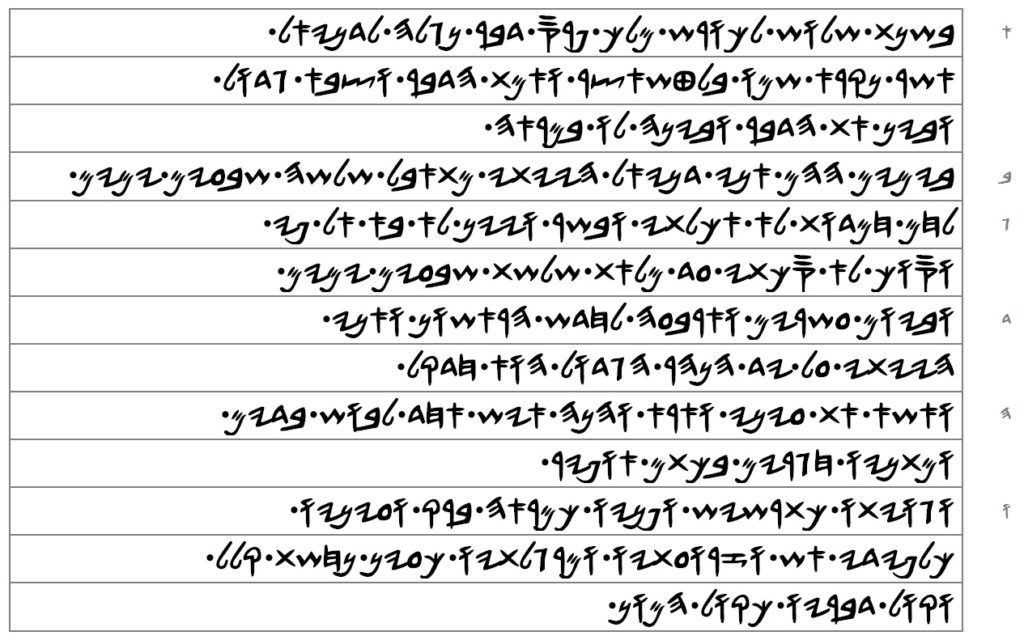
[1] In the third year of Cyrus, king of Paras, a word was revealed unto Danay’al which is called his name Baltasha’tsar, and true is the word, and the host of it is great, and he understood the word, and understanding was to him in the vision.
[2] In those days I Danay’al was mourning three consecutive weeks of days.
[3] Pleasant bread not did I eat, and meat, and wine not did it come to my mouth, and to anoint not did I anoint until it was fulfilled three weeks in a row of days.
[4] In the day twenty and four to the first month, even I was by the great river Khadakal.
[5] And I lifted up my eyes, and I saw; and behold, one man clothed in linen, and his loins were girdled in gold of Opayr.
[6] And his body is like Tharshaysh, and his face like the appearance of lightning, and his eyes like lamps of fire, and his arms and legs like the color of polished brass. And the voice of his words like the voice of a multitude.
COMMENTARY OF DANAY’AL 10:1-6
[1] This third year of Cyrus (547-517 BCE) is counting from his recapture of Babylon from the rebel Nabonidus II (520 BCE) in the spring of 520 BCE. Thus, the year in question is 517 BCE, not long before the killing and beheading of Cyrus on the battle field that same year. The word and vision which was given to Danay’al that year contained tsab’ gadol (‘host of great’), meaning a great deal of detailed information for him to digest, and he says he was able to understand it.
[2-4] Since Danay’al did not eat anything for twenty-one consecutive days in the first month of the calendar year it is clear he did not observe the feast of Pasakh (Passover) and Matsoth (Unleavened Bread). He began his fasting period on Month 1, Day 3, and he concluded it on Month 1, Day 23. Danay’al was a righteous law keeper and as such he knew the feast of Pasakh and Matsoth cannot be observed in the lands of our captivity. People making up their own version of the holy days and doing them at any location they choose are in error. YA’OH does not accept their own made up versions of His feasts.
[5] The man was clothed in real linen. Linen comes from earth. It is a product manufactured on earth. The linen was covering his loins only, which is from the waist to mid thigh. These are breeches. The belt around his waist and holding his breeches up was a fabric interwoven with pure gold. Fabric and gold come from earth. The man’s gold in particular came specifically from Opayr (not Ophir or Uphaz) which is the Philippine islands. According to scripture, Opayr was located in the east, could only be reached by sea ships, and was famous in the ancient world for producing the largest amounts of pure gold (1 Chr. 29:4; 2 Chr. 8:18; 9:10; Ay’ob 22:24; 28:16; Yashai-Ya’oh 13:12). The greatest source of pure gold in the east that can only be reached by ships travelling the sea is the Philippines islands. The Philippines literally sits on mountains of gold, the second largest gold deposit in the world.
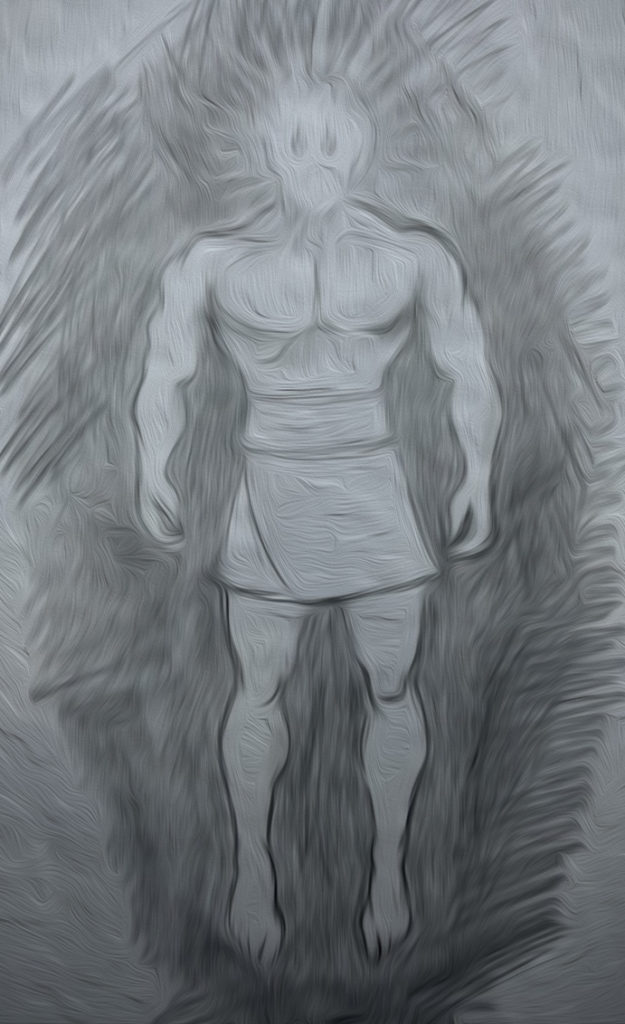
Although the man appearing before Danay’al is obviously not from earth he is clearly a physical being wearing items of clothing that do come from earth. The mal’achaym (messengers, angels) from heaven are not ghosts or spirits. A ghost or a spirit cannot put on real linen breeches held up by a belt woven with real gold. The mal’achaym from heaven are people with physical bodies. They are just not people from earth, but they are real people nonetheless. Their clothes are made from items that originate on earth.
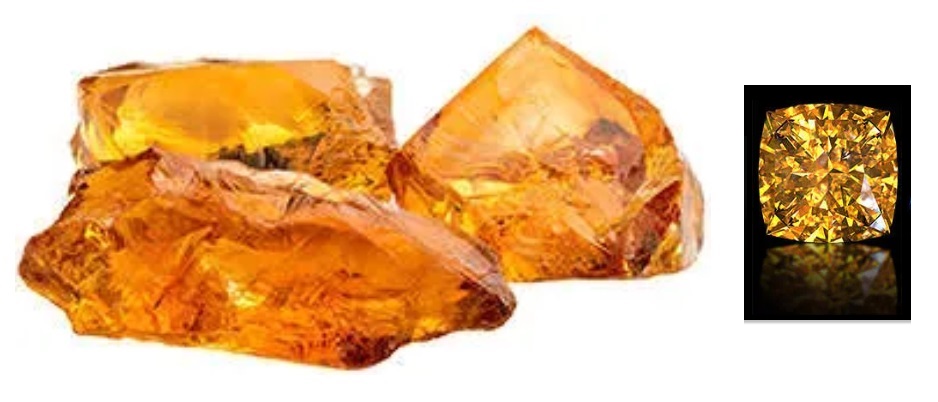
[6] Tharshaysh (Tarshish) has been identified as the island of Borneo in Indonesia. The golden yellow Citrine gemstone (a type of quartz) once highly valued and highly revered for its rarity (it is no longer rare) was exported from this island. Verse 6 does not say the “color” of the heavenly man’s body was like Tharshaysh. It says his body was like Tharshaysh. Color is not in view here but rather the man’s chiseled physique. He was an extremely well built, broad-shouldered man and the definition of his muscles gave him the appearance of being cut like a precious multi-faceted Tharshaysh gemstone. This is also the first stone in the fourth row of the high priest’s breastplate of twelve precious gemstones, and the Tharshaysh gemstone in the breastplate stands for the tribe of Napathalay (Thorah 2.28:20).
You could not see the man’s face because it was as blinding as a flash of lightning. Only his eyes which appeared like two lamps of fire burning a different color against the foreground of the brightness of his face were visible on his face. His arms and his legs could be seen and these were the color of polished brass. This detail makes him a man with naturally occurring dark brown skin color due to the high pigmentation of his skin containing heavy melanin content. This is a black man. The sound of his voice echoed as he spoke his words, as if a crowd of people was speaking.
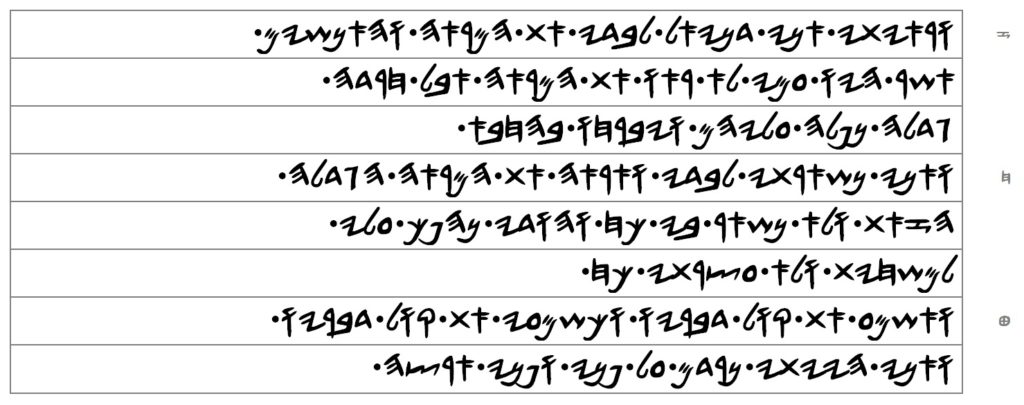
[7] And I saw, I Danay’al alone, the vision, and the men which were with me not did they see the vision, but a great terror fell upon them, and they fled in hiding.
[8] And I was left alone, and I saw this great vision, and not was left in me power, for my vigour was turned upon me into frail corruption, and not did I retain power.
[9] And I heard the sound of his words, and when I heard the sound of his words I was fast asleep upon my face, and my face is towards the earth.
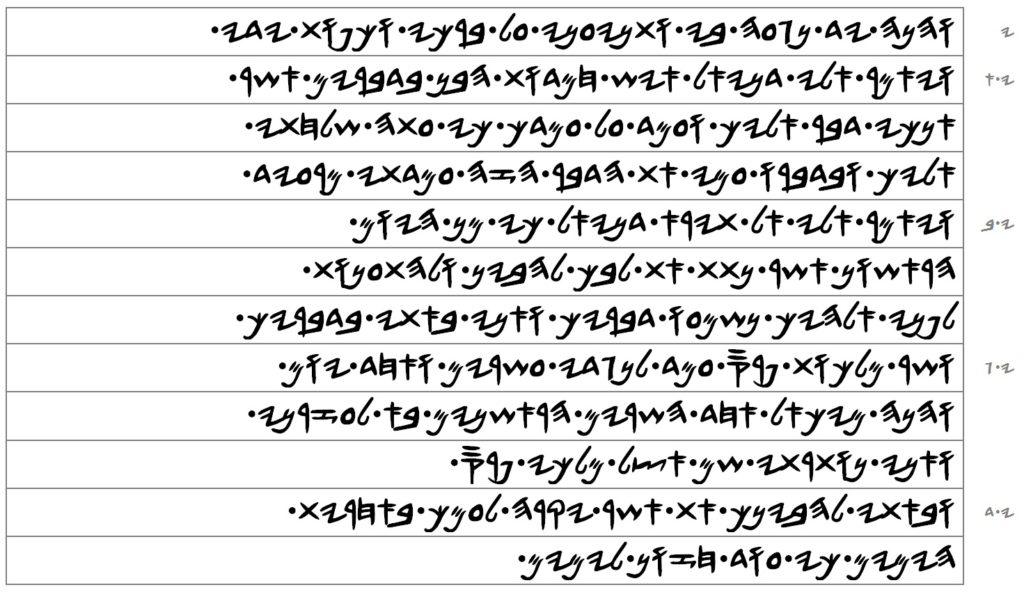
[10] And behold, a hand touched me and set me trembling upon my knees and the palms of my hands.
[11] And he spoke to me: “Danay’al, man of pleasant desires. Understand in the words which I speak to you, and stand upon your stance. For now I have been sent to you.” And when he spoke with me this word I stood up shaking.
[12] And he said to me: “Do not be afraid Danay’al, for since the first day which you set your heart to understand and to humble yourself before your Higher Power, they were heard your words, and I am come because of your words.
[13] Yet the prince of the kingdom of Paras, he occupied me twenty and one days. And behold, May’cha’al, one of the chief princes, came to assist me, and I remained there alongside the kings of Paras.
[14] And I have come to cause you to understand which will befall your nation in the latter of the days, for yet the vision is for days.
COMMENTARY DANAY’AL 10:13
[13] Contrary to Jewish and Christian false doctrine and fable, the messenger from heaven was not being held up for twenty-one days by a fallen angel working for the devil. There are no fallen angels according to Thorah and the prophets. The mention of “the prince of the kingdom of Paras” is simply a reference to Cyrus. Cyrus was ghamad la-nagad (‘standing to the front’) of the messenger because the messenger was tasked with an assignment which had something to do with Cyrus and that task is what was occupying him for twenty-one days. The messenger May’cha’al came to assist him so that he could finish his assignment in twenty-one days and then go appear to Danay’al.
Notice that the messenger mentions “kings of Paras” in the plural. This detail tells us that Cyrus evidently elevated someone to exercise royal power with him upon the throne of Persia, and we know from history that that someone was his son Cambyses. Daray’osh the Mede was appointed by Cyrus to be king of Babylonia in 530 BCE, but not king of Persia. Cyrus elevated his son Cambyses to be king of Persia alongside him in the fall of 519 BCE and Cyrus was killed two years later in 517 BCE. In other words, the messenger’s task was to manipulate and to orchestrate events from behind the scene so that Cyrus would be killed that year. This becomes clear from verse 20. The messenger accomplished that task and set things in motion for the desired outcome with the help of May’cha’al within twenty-one days. Angels do not go to war with other angels. That’s nothing more than the imagination of heathen Jews and heathen Christians gone wild in their pseudo writings.

[15] And when he spoke with me according to these words, I put my face towards the ground and was speechless.
[16] And behold, like the similitude of the sons of man touched upon my lips, and I opened my mouth, that I may speak, and that I may say to the one standing to the front of me, “Lord, in the vision they have turned my sorrows upon me, and not have I retained power.
[17] For how is it possible, a servant of this my lord to speak with this my lord, and I, immediately not will there stand in me power, and breath is not left in me.
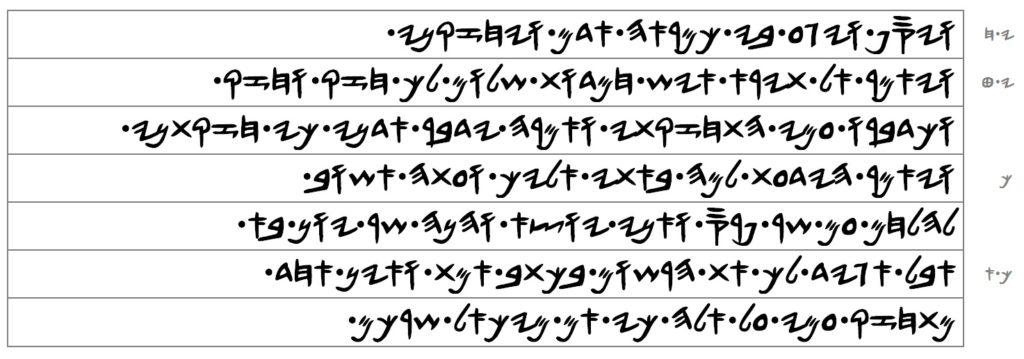
[18] And again, and someone touched me, like the appearance of a man, and he strengthened me.
[19] And he said to me: “Do not be afraid, man of pleasant things. Shalom to you. Be strong! And be strong! And when he spoke with me I strengthened myself, that I might say: “Let my lord speak, for you have strengthened me.”
[20] And he said: “Do you know why I have come to you? And now I will return to war with the prince of Paras. And I am the one going forth, and behold the prince of Yon is coming.
[21] But I will declare unto you the notation in the Writing of Truth, and there isn’t one strengthening himself with me these except May’cha’al your prince.”
COMMENTARY ON DANAY’AL 10:20-21
[20] The messenger’s assignment will now require him to return and go to war with the prince of Paras, i.e. with Cyrus. Events had been orchestrated and set in motion over the past twenty-one days and the only thing left for the messenger to do was to see to it that Cyrus was killed on the battle field as planned. The messenger then tells Danay’al that he is the one going forth (from that battle) and this will set other events in motion that will eventually lead to the coming of “the prince of Yon”, which is a reference to the future conquest of the Persian empire by Alexander the Great in 330 BCE.
Alexander the Great, of course, was actually a Macedonian Greek. He was not a Ionian Greek and he was not a descendant of Yon the son of Yapath (Thorah 1.10:2). Yon is used here in Danay’al 10:20 to as the general designation for the lands in Europe that the descendants of Yapath lost to invaders of Shamite (Semitic) descent. The Yapath lineages in Europe were pushed out of Europe by waves of incoming Shamites (Indo-Aryan hordes) invading from the east. The earlier Yapath lineages became all but extinct within Europe and they exist today in Africa for the most part. Alexander and his Greeks where Indo-Aryan Shamites who descended from Yaktan (Joktan) the son of Ghabar.
[21] The Chathab Amath (‘Writing of Truth’) is evidently the record of everything that will happen in history that impacts on the fortunes of people of Ya’oh-shar-al, and the messenger speaking with Danay’al and May’cha’al are the only messengers from heaven allowed to know its full contents. What is revealed to Danay’al is only a summary and excerpts of the book’s contents. We learn that May’cha’al is the prince of the nation of Ya’oh-shar-al, and therefore the man speaking with Danay’al who is of higher rank than May’cha’al since he is in possession of the Writing of Truth and May’cha’al is his assistant, is the prince that May’cha’al answers to. He had authority over the Persian nation and arranged the killing of Cyrus. He was over the Greeks and arranged the conquest of Alexander the Great. We will hear more about this in Danay’al chapter 11. In other words, the man speaking with Danay’al is the prince of all princes, the head angel in charge. We’ve met this man before in scripture. He is the same man who appeared to Ya’ohshai (Joshua) Ban Non in Ya’ohshai 5:14 where he identified himself as the shar tsab’ YA’OH (‘the prince of the host of YA’OH’) and where he acted as the quarterback who called out the plays for the destruction of Yarakho (Jericho). As his title implies, he is in charge of all angels and they report to him as their commanding officer, whereas he reports to no one except YA’OH.

[1] And I, in the first year of Daray’osh the Mede, my stance was to be one who strengthens, and to be a defense for him.
COMMENTARY ON DANAY’AL 11:1
[1] The words ghamad-ay and mai’oz are not verbs despite the 1611 Queen James Virus translation and other heathen translations in English. These words are nouns. The first noun means “stance” and it has a possessive pronominal suffix in the first person, i.e. “my stance.” The second noun means “defense”. The messenger is telling Danay’al what he did in the first year of Daray’osh the Mede to keep Daray’osh from being removed as king of Media. The chronology of the Medo-Persian empire as reconstructed by modern Europeans, a chronology which considers Daray’osh the Mede to be a fiction, is incorrect. Cyrus the Great was not killed in 530 BCE. He abdicated the throne of Babylonia and gave the province to his relative Daray’osh of Media who reigned there for ten years (530-520 BCE). Nabonidus II, son of Nabonidus I, led a revolt in Babylonia against Daray’osh the Mede, forcing him to leave and return to Media. Cyrus subdued the rebellion, recaptured Babylon in 520 BCE, and commenced his second throne tenure as king of Babylon.
However, Cyrus did not wish to be tied down in Babylon as he had been from 539 to 530 BCE, so he elevated his son Cambyses to be king in the fall of 519 BCE. Daray’osh the Mede succeeded to the throne of Media in 518 BCE with the death of his father Akhashorosh (Cyaxeres II). But when Cyrus was killed in battle in 517 BCE, the official first year of Daray’osh the Mede in Media, the fate of the Median kingdom became uncertain, as the Medes had just lost the man who allowed their monarchy to coexist with the Persian monarchy after the capture of Astyages by Cyrus in 550 BCE, and there was no telling what Cambyses, the successor of Cyrus, would do. The shar tsab’ YA’OH made sure Daray’osh the Mede would not lose his throne in Media in 517 BCE. He would keep this throne and Media would not be absorbed into the Persian empire and turned into a province at that time. This is the meaning of Danay’al 11:1.
Modern scholars believing that Cyrus died in 530 BCE are dismissing and overlooking evidence to the contrary, and not just biblical evidence. If the 5th century Greek historian Herodotus, the father of lies, is correct and Cyrus was dead before Cambyses conquered Matsraym (Egypt) in 525 BCE, then why did Cyrus have himself depicted wearing the traditional hemhem crown that was only worn by genuine kings of Matsraym? Why did the Greek historian Xenophon correct Herodotus and relate that Cyrus was alive when Matsraym was conquered by the Persians (Xenophon, Cyrop., 1.1.4; 8.6.19-20)? The only plausible answer is that when Cambyses became king of Matsraym in 525 BCE so did his father because he was still alive and still the senior monarch of the Persian empire.
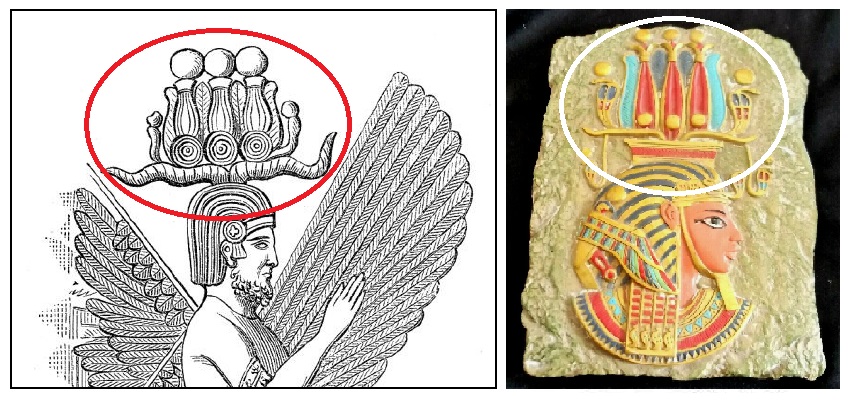
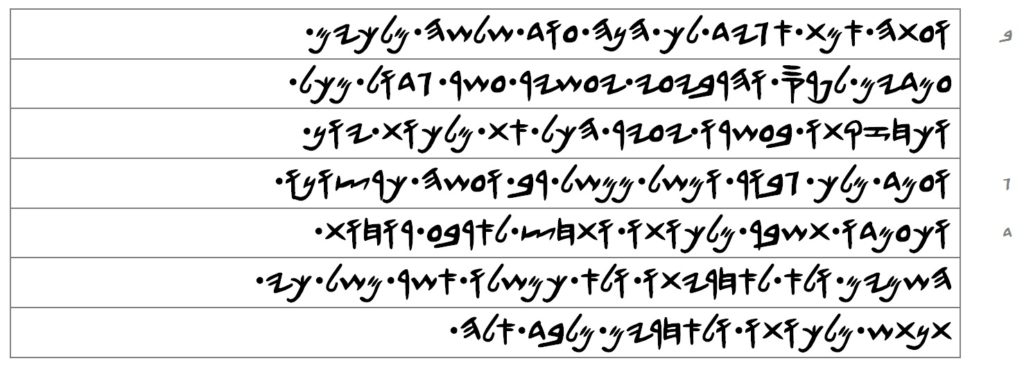
[2] And now, the truth will I declare unto you. Behold, yet three kings are standing for Paras, and the fourth will be wealthy to the extreme than all. And when he strengthens himself by his riches he will stir up all with the king of Yon.
[3] And a mighty king will stand up, and rule a great dominion, and he will do according to his own will.
[4] And when he is standing up his kingdom will be broken, and scattered to the four winds of the heaven, and not to his successors, and not like when he ruled that which he ruled, for it will be plucked up his kingdom and be for others beside these.
COMMENTARY OF DANAY’AL 11:2-4
[4] The three kings of Persia yet to stand up as of 517 BCE are Cambyses, then Barziya the brother of Cambyses, the Vahyazdata another brother of Cambyses. Cyrus and these three sons of his were the last kings of the Anshan dynasty in Persia. The Anshan dynasty was overthrown by a fourth king named Daray’osh Hystaspes (509-473 BCE) the Achaemenid in 509 BCE. Daray’osh Hystaspes accused Barziya and Barziya’s successor Vahyazdata of being imposters. He was behind the mysterious death of Cambyses in 511 BCE and managed to kill Barziya in a coup at the royal palace seven and a half months later. Vahyazdata was elevated to the throne by his people in Persia who rejected Daray’osh Hystaspes as a lying usurper. Daray’osh Hystaspes could not eliminate Vahyazdata until 509 BCE. At that point, the Persian Anshan dynasty was extinguished and replaced with the Persian Achaemenid dynasty.
The incoming dynasty founder Daray’osh Hystaspes ended up being the richest of all the former Persian kings, and his policies made him very disliked in Greece. War broke out between Persia and Greece at the Battle of Marathon in 490 BCE. Daray’osh Hystaspes vowed to punish Greece and began making preparations to invade the Greek mainland. However, age and bad health prevented the king from leading a vast expedition in person so he elevated his son Xerxes to the throne of Persia alongside him in 486 BCE and Xerxes was charged with finishing the war preparations and leading the campaign against the Greeks in person in 480 BCE.
For the record, the co-regency of Daray’osh Hystaspes and Xerxes is attested by a number of pieces of evidence, all of which are dismissed by modern European historians. One of the most explicit and compelling pieces of evidence is a double dated inscription at the Wadi Hammamat in Matsraym. The inscription states that “year 36” of Daray’osh Hystaspes was also “year 13” of his son Xerxes, i.e. 474 BCE.
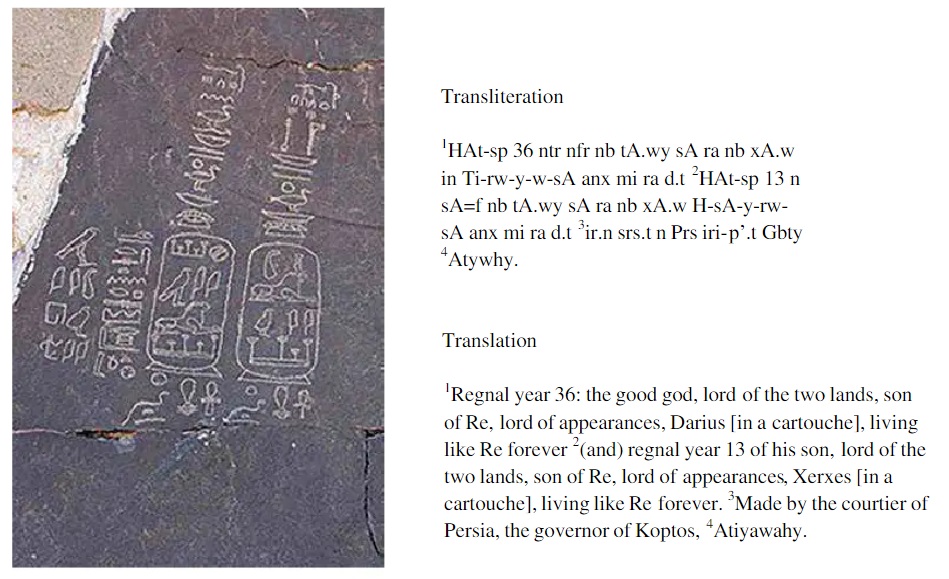
The inscription amounts to unambiguous and conclusive proof that Daray’osh Hystaspes did not begin his reign in 522 BCE, but that conventional wisdom is wrong and he began his reign in 509 BCE. The year 486 BCE was the accession of Xerxes but not the year of his father’s death. The attempts made in the past to try and explain this evidence away are forced. The evidence backs up the Book of Danay’al that an important king’s reign is missing from the faulty European reconstruction of the early Persian period time-line between Cyrus and Daray’osh Hystaspes.
[3] Xerxes was unable to accomplish all that he and his father had planned in Greece. Yet the conflict between Persia and Greece set the stage for the emergence of Alexander the Great who was determined to destroy the Persian empire for the burning of Athens by the Persians during their invasion of the Greek mainland.
[4] Alexander’s light burned very bright but also very brief. He died in 323 BCE and his mentally disabled elder brother Philip III became king. Philip III died in 317 BCE, and then Alexander’s young son Alexander IV became king. Neither were able to rule the kingdom and establish their authority the way Alexander the Great had done. The real power was dispersed among Alexander the Great’s top officials, one of whom had Alexander IV and his mother Roxanne secretly assassinated in 309 BCE. With Alexander IV out of the way, and with Alexander the Great having no more heirs to succeed him, his generals began carving up the empire for themselves and wars ensued among them as a result of the power struggle.

[5] And the king of the south will be strong, and one from his princes will be strong upon him and he will rule a dominion greater than his dominion.
COMMENTARY OF DANAY’AL 11:5
[5] Ptolemy I Soter (305-282 BCE), the former general of Alexander the Great, put a crown on his own head and made himself king of Matsraym (Egypt) in 305 BCE. He is the malach ha-nagab (‘the king of the south’) in this verse. Seleucus I Nicator, the former officer under Ptolemy I, captured Babylonia in 312 BCE and later followed the example of Ptolemy I and crowned himself king in 305 BCE. His kingdom became much larger than Ptolemy I’s and included Asia Minor, Syria, Mesopotamia, and the Iranian Plateau. He is the shar (‘prince’) of this verse who obtained a dominion greater than that of the malach ha-nagab.

[6] And at the end of years they will join themselves together, and the daughter of the king of the south will come to the king of the north to make an agreement, but not will she retain the power of the arm, and not will he stand, and his arm; but she will be given up, her and the ones who brought her, and he that begat her, and the one who strengthened her in the times.
COMMENTARY OF DANAY’AL 11:6
[6] The kats shamaym (‘end of years’) is always the seventh year shamatah/shabath, and 253 BCE was one of these. The conflict between Ptolemaic Egypt and Seleucid Syria was resolved this year when Antiochus II (262/1-246 BCE) made peace and joined with Ptolemy II Philadelphus (283-246 BCE). As part of the settlement, Antiochus II had to divorce Laodice and marry Ptolemy II’s daughter Berenice. Only the children born from Berenice would inherit the Seleucid throne. But when Ptolemy II died in 246 BCE the power of the arm for Berenice was now gone and Antiochus II resumed his relations with his former wife Laodice. He abandoned Berenice and their infant son in Antioch to go live with Laodice in Asia Minor.
However, Antiochus II died (or was poisoned by Laodice) the same year in 246 BCE. Berenice declared her infant son to be Antiochus II’s successor but a succession dispute broke out immediately. Berenice and the ones who brought her to Antioch were all “given up” to a plot to be murdered, including the infant son, in order that Laodice’s eldest son Seleucus II, both of whom were in western Asia Minor at the time, could claim the throne of his forefathers. Berenice’s brother Ptolemy III (246-222 BCE), the one who supported her in these times, marched out to aid his sister but it was too late. By the time he arrived at Antioch they were already dead. Ptolemy III was handed a huge setback at the realization that his sister and his infant nephew had been given up to death. Enraged, he renewed the conflict between the two realms, a war which is dubbed the Third Syrian War by the heathens.

[7] And it stands, from a branch of her roots, his estate. And he will come against the army and come into the fortress of the king of the north, and he will do in them, and prevail.
COMMENTARY OF DANAY’AL 11:7
[7] The one who stands from a branch of Bernice’s roots cannot be referring to Ptolemy III who has already been mentioned in the previous verse. This is Ptolemy IV (221-204 BCE) son of Ptolemy III. This verse and the next one allude to the so-called Fourth Syrian War with the Seleucid empire (219-217 BCE). In 217 BCE, Ptolemy lV led the Egyptian army into the Levant and fought the Battle of Raphia on 22 June 217 BCE. Antiochus III the Great (222-187 BCE) was forced to retreat to his fortress at Antioch. After the battle, Ptolemy IV set to work re-organizing the situation in Coele-Syria and sent Sosibius to negotiate with Antiochus III. At the end of the summer of 217 BCE, Ptolemy IV invaded Seleucid Syria and besieged the Seleucid fortress at Antioch, forcing Antiochus III to accept a peace treaty.

[8] And also their gods with their principals (men of nobility) with their precious vessels of silver and gold in captivity will he come to Mastraym; then he, years will he stay away from the king of the north.
[9] And he will come into the kingdom, the king of the south, and return to his own land.
COMMENTARY OF DANAY’AL 11:8-9
[8-9] Ptolemy IV received an enormous sum of gold and other booty from Antioch to take back to Matsraym. From 217 BCE to his death in 204 BCE, Ptolemy IV stood away from Antiochus III and left him alone. When Ptolemy IV returned to his own land after his victory over Antiochus III he spent the rest of his years as king focusing on domestic matters and maintaining peaceful relations with the Seleucids and preventing warfare.

[10] and his sons will be stirred up, and they will assemble a multitude of forces great, and coming he comes and he is overflowing and passing on, and he will return and be stirred up against his fortress.
COMMENTARY OF DANAY’AL 11:10
[10] “His sons” in this verse refers to the regents of Ptolemy IV who ruled the kingdom after his death in 204 BCE while his actual son Ptolemy V was still an infant. These regents attempted to beef up the military in the Ptolemaic territories but they proved to be incompetent and Antiochus III took advantage of the internal turmoil and weakness to launch the Fifth Syrian War (202-196 BCE). Ptolemaic Egypt lost all of its territories in Asia Minor and the Levant as Antiochus III quickly swept through Cole-Syria. He completed the subjugation of Coele-Syria in 198 BCE and spent that year solidifying his conquest of Coele-Syria and also of Ya’ohdah, which would never again return to Ptolemaic control. In 197 BCE, Antiochus III returned and attacked the Ptolemaic territories remaining in Asia Minor, conquering the Ptolemaic fortress in Cilicia and cities there.

[11] and he moved himself with bitterness, the king of the south, and he went forth and fought with him, with the king of the north, and he set forth a multitude great, and it was given the multitude into his hand.
COMMENTARY OF DANAY’AL 11:11
[11] Ptolemy V came of age in 196 BCE and made peace with Antiochus III, leaving the Seleucid king in possession of Coele-Syria, but he habored “bitterness”. When Antiochus III died in 187 BCE and was succeeded by his son Seleucus IV (187-175 BCE), Ptolemy V began preparations for renewed warfare with the Seleucid empire to recapture Coele-Syria and Ya’ohdah. Mercenaries were recruited from Greece in 185 BCE. The alliance with the Achaean League was revived at the same time. Ptolemy V’s eunuch led a naval raid on Syria in 182 BCE, attacking the island of Aradus. But all of this manoeuvring was abruptly cut short by Ptolemy V’s sudden death in 180 BCE, allegedly poisoned by courtiers worried about the cost of the war. The great multitude set forth by Ptolemy V, i.e. the Achaean League of Greek city states, was given into the hand of Seleucus IV as he managed to renew the Seleucid alliance with the confederation after the death of Ptolemy V. For more on this, see Siculus, Diodorus. Bibliotheca Historica. Vol. 29.10.15.

[12] And he took the multitude and exalted his heart, and he caused to fall away ten thousands, but not will he be strong.
[13] And will return, a king of the north, and he will set forth a multitude greater than the former. And at the end of the times of years, will he certainly come in an army great, and in equipment great.
[14] And in the times those, many will stand against the king of the south, and the children of robbers of your nation will lift up themselves to cause to withstand the vision, but they will be stumbled.
COMMENTARY OF DANAY’AL 11:12-14
[12] Despite taking the Achaean League away from the Ptolemies, which went straight to his head given that the league maintained 8,000 mercenary foot and 500 mercenary cavalry, added to a picked citizen force of 3,000 infantry and 300 cavalry, i.e. “ten thousands” which Seleucus IV caused to fall away from the Ptolemies, he was not strong. Seleucus IV was assassinated on Ululu 10, SE 137 (i.e., Sep 3, 175 BCE) by Heliodorus, one of his leading bureaucrats, and Seleucus IV’s son Antiochus became king. Antiochus IV Epiphanes (175-163 BCE) and his son, another one named Antiochus, arrived in Syria from Athens and Antiochus IV proclaimed himself and his son co-rulers. He removed Heliodorus and kept his nephew king Antiochus, son of Seleucus IV, in the shadows. Then Antiochus IV murdered his son Antiochus in the month of Abu in SE 142 (i.e., 31 Jul-28 Aug, 170 BCE) and his nephew, Seleucus IV’s son Antiochus, was restored to co-regent, but he died or was murdered in SE 148 in the month of Kislimu (between 20 Nov-18 Dec 164 BCE). The corpse of the deceased Antiochus IV’s nephew was escorted to Babylon in SE 148 in Tebetu (19 Dec 164 BCE – 16 Jan 163 BCE).
[13] Antiochus IV set forth a much greater multitude of supporters on his side than the Achaean League that his brother Seleucus IV obtained. Antiochus IV added Roman and the Pergamene forces of Eumenes II, Rome’s principal ally in the region, to his multitude. “At the end of the times of years,” which refers to a seventh year shabath, Antiochus IV moved against Ptolemaic Egypt. This was the year 169 BCE.
[14] Ptolemy VI Philometer (180-164 BCE, 163-145 BCE) demanded the return of Coele-Syria in 170 BCE and declared war on the Seleucid empire. Antiochus IV attacked and defeated the Ptolemaic forces as soon as they marched out from Pelusium in 169 BCE. He then seized Pelusium which gave him access to all of Egypt. He advanced into Egypt proper in 168 BCE and conquered all but Alexandria and captured Ptolemy VI. The “many” who stood against this king of the south at this time included the entire populace of Alexandria which chose a new king, one of Ptolemy VI’s brothers named Ptolemy VIII.
The robbers of our nation who lifted themselves up and attempted to withstand the vision were the reformist pro-Hellenizer parties. In 171 BCE, Antiochus IV removed the moderate pro-Hellenizer high priest Jason and appointed the extremist pro-Hellenizer Menelaus high priest instead. While Antiochus IV was busy in Egypt in 168 BCE, the former Hellenizer high priest Jason attacked Yaroshalam with 1,000 soldiers and forced the incumbent Hellenizer high priest Menelaus to flee. Antiochus IV assumed all of Ya’ohdah was in revolt against him. So he set out from Egypt and slaughtered our people indiscriminately, making no distinction between different factions.
Thus, both parties of Hellenizers who turned their backs on the vision of scripture were “stumbled”. The vision calls them robbers because instead of leaving to go be Greek among the heathen Greeks they stayed amongst us and exploited our people by using Thorah as a way to line their pockets. But Antiochus IV took things to a whole new level. In 167 BCE, he outlawed Thorah and ordered the worship of Zeus as the supreme god, an edict which must have appalled both the moderate and even the extreme Hellenizer parties of our nation. This was anathema to all of our people no matter what faction. Because they refused, Antiochus IV sent an army to enforce his decree. The city of Yaroshalam was destroyed and the holy second temple was desecrated as a result of the resistance. Many were slaughtered, and Antiochus IV established a Greek military citadel called the Accra on the south side of the temple mount. This triggered the Maccabean Hasmonean revolt and the temple was eventually reclaimed and re-consecrated in SE 148 (164 BCE).
The pride of the Hasmonean Period dissipated after the death of Alexandra (76-67 BCE) in 67 BCE when war immediately broke out between her two sons, Aristobulus II and Hyrcanus II the high priest. At the end of this conflict the Romans took from our people in 63 BCE that freedom which they had fought long and hard to wrest from the Seleucid kings.
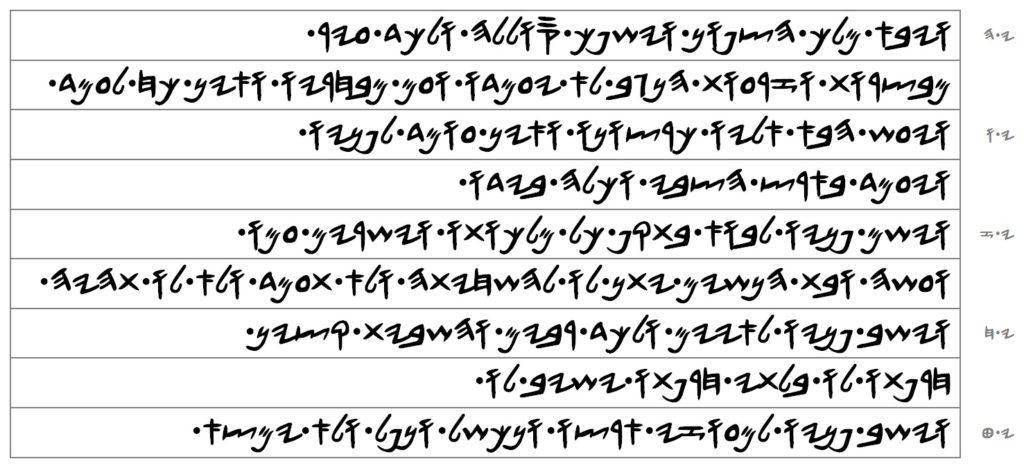
[15] And a king of the north will come, and he will throw up a mount, and he will take cities fenced up, and the arms of the south, not will they withstand, even with his chosen ones, and there is no power to stand.
[16] And he will do, the one coming against him, according to his will, and there is none standing before him, and he will stand in the land the glorious, and consume it by his hand.
[17] And he will set his face to come in the authority of all his kingdom, and upright ones with him, and he will do, and the daughter of women, he will be caused to be given to him to corrupt her, and not will she stand, and not for him will she be.
[18] And he turned his face to the isles and he captured many. And he will cause to cease the magistrate of his reproach to him, without his reproach. He will cause it to return to it.
[19] And he will turn his face to the fortresses of his land, and will be stumbled and fall, and not will he be found.
COMMENTARY OF DANAY’AL 11:15-19
[15] The “king of the north” at this time can only be Pompey of Rome. In 63 BCE, Pompey captured the fenced cities in our land and cast up a mount or rampart on the north side of the temple mount in order to engage Aristobulus II, “the arms of the south,” in a regular siege. A frightful massacre of our people took place, including the priests, “his chosen ones,” who would not stop from performing their office even after the wall was finally breached by the Roman battering-rams and siege engines.
[16] Pompey forced his way into the temple and into the most holy place. No one could stand before him and stop him from doing his will. Those of our people who promoted the war were beheaded. The country was reduced to a tributary of Rome. The boundaries of Ya’ohdaym territories were greatly curtailed and “consumed”. The coastal towns from Raphia to Dora were taken away from our people, including the heathen towns under our authority on the east of the Yardan. All of these towns were immediately put under the rule of the governor of the newly-formed Roman province of Syria. The much reduced territory of Ya’ohdah was given to the high priest Hyrcanus II, but without the title of king.
[17] After Pompey made his arrangements in our land he hasted away again to Asia Minor and first of all to Cilicia. He took Aristobulus II and other Ya’ohsharalay, “upright ones,” along with him as prisoners of war to be put on display in his triumph in Rome in 61 BCE with great magnificence. But Pompey’s eminence was offensive to Caesar and an obstacle to Caesar’s own ambitious rise to power, so he caused Pompey to tie him to himself in 59 BCE by marrying him to his daughter Julia, “the daughter of women,” i.e. one of the most eminent and most beautiful of women in Rome at that time, even though she was already betrothed to another man. The intent was fraudulent, the aim of which was to corrupt Julia against Pompey by betraying his interests and his designs to her father Caesar. Yet his designs did not take effect, for Julia loved her husband Pompey and did not stand with her father’s artifices. She died in 54 BCE before the breach between her husband and her father become inevitable. This was the end of Caesar’s pretense of a good relationship with Pompey.
[18] Caesar set his sights on the invasion of the British isles during the Gallic Wars (58-51 BCE) which greatly extended Roman territory. These achievements and the support of his veteran army threatened to eclipse the standing of Pompey, who had realigned himself with the Senate, i.e. the “magistrate” (collective noun) after the death of Crassus in 53 BCE. With the Gallic Wars concluded, the Senate ordered Caesar to step down from his military command and return to Rome. This was a “reproach” to Caesar. But in 49 BCE, Caesar openly defied the Senate’s authority by crossing the Rubicon and marching towards Rome at the head of his army. This began Caesar’s civil war, which he won. He caused the Senate’s reproach to return to the Senate, leaving him in a position of near unchallenged power and influence in 45 BCE.
[19] After assuming control of the government, Caesar turned his attention to the internal affairs of the empire and began a series of social and governmental reforms. He took steps to transform his own land of Italy with all of its “fortresses” into a province. But his populist and authoritarian reforms angered the elites who resented him and began to conspire against him. On the Ides of March (15 March), 44 BCE, Caesar was assassinated by a group of rebellious senators led by Brutus and Cassius, all of whom stabbed Caesar to death a total of twenty-three times.

[20] And will stand up in his estate one who raises taxes in the glory of the kingdom, but in days few will he be broken and not in anger and not in battle.
[21] And will stand up in his estate one who is despised, and not did they give upon him the honor of the kingdom, and he came in peaceably and seized the kingdom by slipperies.
[22] And arms of the flood will they be overflown from before him, and they will be broken, and even the ruler of the covenant.
[23] And from alliances made with him will he do treacherously. And he will come up and become strong with a few people.
COMMENTARY OF DANAY’AL 11:20-23
[20] Antipater the Edomite had attached himself to Caesar in 47 BCE by helping him in the Alexandrian War at the conclusion of which Caesar went to Syria and rewarded Antipater by conferring upon him the right of Roman citizenship and immunity from tribute (Josephus, Antiq., 14.8.3-5). From that moment forward, all Edomite convert “Jews” descended from Antipater were automatically Roman citizens at birth. Antipater was made procurator of Ya’ohdah, the “glory of the kingdom,” and charged with being the “raiser of taxes” there. But in 43 BCE, within just a few years of his appointment by Caesar, Antipater was murdered by poison. He was not destroyed in anger and not in battle, but by the jealousy and bribery of Malichus whose ambition was to gain as influential a position in Ya’ohdah as Antipater had done.
[21] Herod the Great, the son of Antipater, avenged his father’s death by having Malichus killed. After this Herod set himself on a course to become what neither his father nor his father’s fathers ever could. Antipater had been a close friend of Marc Antony and Antony recalled this friendship when he appointed Antipater’s two sons, Herod and his brother Phasael, as tetrarchs of Ya’ohdah in 41 BCE. In December of 39 BCE, Herod arrived in Rome and secured the kingship of Ya’ohdah for himself by means of diplomatic slipperies which came with vast sums of money. An Edomite had peaceably seized the kingdom of Ya’ohdah by purchasing it from Marc Antony and Octavian (Augustus). He was appointed king over us in our own land by a decree of the Roman Senate, in direct violation of our law in Thorah 5.17:15.
[22] From the appointment by Rome to the actual possession of the kingdom took a few years. Herod had to form alliances and collect an army in order to contest the king and high priest Antigonus (39-36 BCE) who had been installed in Yaroshalam by the Parthians. Herod landed at Ptolemais from Italy in 38 BCE, quickly collected an army, and, being supported by the Romans, he took all Joppa, and gained possession of Masada.
[23] As the arms of Herod’s flood overthrew opposition the number of his men increased. His “few people” became strong enough to the point where he could venture to go to Yaroshalam the same year and lay siege to it in a “treacherous” act of treason against our people and against our Thorah. I repeat, the law forbids a foreigner, even a convert, to be king over us in our own land (Thorah 5.17:15), but Herod could not be bothered by the laws of the Thorah.

[24] By prosperity, and by the fattest parts of the province, will he come and he will do that which not they did the fathers of him, even the fathers of his fathers. Prey, and spoil, and goods for them will he disperse and against strongholds he will devise his devices, even unto a time.
[25] And he will stir up his power and his mind against the king of the south with a great army, and the king of the south will stir himself to battle with a great army and mighty unto exceedingly, but not will he stand for they will devise against him devices.
COMMENTARY OF DANAY’AL 11:24-25
[24] The fattest parts of the province were in the Galayl (Galilee) most of which joined Herod after he returned from Rome. An Edomite, believe it or not, was winning over strangers and our own people in this region in part because of the friendship they had with Herod’s father Antipater, and because of the prosperity and the splendor of Herod’s appearance after his return from Italy, by the prey, spoil, and goods he dispersed to them, and by the hopes of receiving still more if he were to be established in the kingdom (Josephus, Antiq., 14.15.1). Neither Herod’s fathers, nor the fathers of his fathers, would ever have been accepted by our people as kings over us because they were Edomites, but Herod was able to corrupt the people of his generation with gifts and massive sums of money.
[25] Before marching on Yaroshalam Herod made sure that key strongholds in the northern part of the land were not left in his enemies’ hands before dealing directly with Antigonus, the “king of the south” who had a massive number of armed men. Once Herod subdued most of the Galayl (Galilee) and saved his family in Masada he marched to Yaroshalam with the Romans under the command of Sosius. Herod pitched the camp on the western side of the city and had a proclamation made to the men of Antigonus upon the wall that he had only come for the liberation of the city, and for the good of the people, and that he would forgive and forget even the greatest of offenses which his enemies had done to him in the past. This was clearly a ploy since Herod was definitely going to avenge his brother Phasael and not excuse Antigonus for the suicide his brother committed instead being a captive of the Parthians.
Upon hearing this lie, Antigonus responded with one of his own and directed it at the Romans who came with Herod. First, Antigonus spoke the truth that Herod was of vulgar pedigree, being an Edomite by descent, and thus the kingdom should not be bestowed upon such a person by the Romans on account of that fact (Josephus, Antiq., 14.15.2). Then came the deception that if the Romans bore ill-will towards Antigonus then it would not be right to pass over a “priest” of the Hasmonean royal family since he would be a better candiate for the throne. Yet the only one in the family old enough was his uncle Hyrcanus who was taken captive by the Parthians right after Antigonus had Hyrcanus mutilated by cutting off his ears so that he could never be priest again! The siege of Yaroshalam was suspended as the winter of 38 BCE set in and the Romans and Herod’s men went into their winter quarters (Josephus, Antiq., 14.15.3).

[26] And the ones devouring his portion, they will break him, and his army will be overthrown, and they will fall slain many.
[27] And both of them, the kings, their hearts are for ploy, and upon the same table a lie they will speak, but not will it succeed, for yet the end is for an appointed time.
[28] And he will return to his land with great substance and his heart is against the covenant holy, and he will do, and return to his land.
COMMENTARY ON DANAY’AL 11:26-28
[26] The indifference and inactivity of Sosius in Syria during 37 BCE (Cassius Dio, Roman History, Book XLIX, 23.1) was in part a result of the fact that Antigonus had bribed him (Josephus, Antiq., 14.15.3). The Romans laid aside their arms and enjoyed the provisions provided by Antigonus. When these were exhausted Sosius threatened to quit Syria but Herod pursuaded him to stay and supplied his men with abundant provisions. The Parthians renewed their attack upon Syria in 37 BCE and Ventidius defeated them in the summer. After this Ventidius summoned Sosius and ordered him to help Herod finish the war.
Desirous of showing off his might and the great multitude of his forces, Antigonus sent a “portion” of his army under Pappus to Samaria to show Herod just how strong he was and that he had more than enough men to spare in this war (Josephus, Antiq., 14.15.12). But Herod and his men utterly “devoured” his portion. Pappus and his men were ruthlessly cut down. His army was completely overthrown and immense numbers of dead bodies were heaped upon one another in the houses where they had retreated. At that point, with the exception of the capital Yaroshalam, the whole country had now fallen into the hands of Herod. Only the coming on of winter in 38/37 BCE hindered him from marching immediately upon Yaroshalam for the second time.
[27] Before the crushing defeat of Pappus, Antigonus and Herod had attempted diplomatic ploys in order to oust the other from power. Both kings were propagating a lie “upon the same table”, meaning with the same goal of depriving the other in mind. But the ploy of each king failed; for neither did Antigonus’ men defect and admit Herod and his army into the city, nor did the Romans fall for Antigonus’ Machiavellianism. Their ploys were not allowed to succeed because “the end” had already been predetermined by YA’OH to take place at the start of the “appointed time” of the shabath year and the end of a 49-year jubilee cycle in 36 BCE.
In the spring of 37 BCE, as soon as the rigor of the winter season was over, Herod returned and laid siege to the capital for the second time. He began to erect his military engines of assault on the northern side of the city where Pompey did twenty-seven years earlier. These works were finished by the summer of 37 BCE and the battering rams began to shake the walls. With Sosius now firmly on Herod’s side the wall was breached and the city was captured on the date of 10.2.5193 which was Tebet 10 (Thursday, January 2, 36 BCE [Julian]) in the Babylonian lunar calendar. This was a fast day for those Ya’ohdaym who were Pharisees (Josephus, Antiq., 14.16.4) and who had adopted the heathen Babylonian lunar calendar over the biblical 364-day calendar. The sect of the Pharisees was also incorrectly reckoning shabath years as beginning in the fall season instead of the spring season. Thus for them the fall of 37 BCE to the fall of 36 BCE was the shabath year (Josephus, Antiq., 14.16.2) but the correct shabath year was from the spring of 36 BCE to the spring of 35 BCE.
[28] When Herod got the capital put into his power he thoroughly plundered the city of every bit of its wealth (Josephus, Antiq., 15.1.2). Because the shabath year was in progress and the land was forced to remain uncultivated according to the law he would have needed to return to his own native land of Idumea in the southern part of Ya’ohdah in order to obtain provisions for his army; but before he carried off the “great substance” of Yaroshalam and returned to his land he was moved against the holy covenant by asking a favor from Antony. Sosius carried Antigonus away to Antony at Antioch and Herod appealed to Antony to have the Hasmonean high priest executed immediately.
Thus, after Antigonus’s three-year reign during which he led our fierce struggle for independence against the Romans the Hasmonean dynasty was terminated in the year 36 BCE and the period of the Edomite Herodian dynasty commenced. This dynasty fulfilled the prophecy of Thorah 1.27:40, for these Edomites broke the yoke of servitude we placed upon their necks for centuries and obtained the rulership over us in our own land at the same time. It was a blow from which our people have yet to recover from, a blow that ultimately led to the end of the ownership of our promised land, and the end of our existence as a people there, from 70 CE until this day.
The messenger form heaven speaking with Danay’al was relaying to him information contained in the Writing of Truth with regards to the history of our people in our land during the period of the sixty-nine weeks (69 x 7 = 483 years) from 519 BCE to 36 BCE. Every detail mentioned in Danay’al 11:1-28 has already happened. The final week of the 70 weeks prophecy is on hold until our people have returned to take possession of our promised land.

[29] At the appointed time he will return and come against the south, but not it will be like the former and like the latter.
[30] And they will come against him ships of Chathaym, and he will be disheartened, and return, and be incensed against the covenant holy, and he will do, and return and that he may be informed about the ones who forsake the covenant holy
COMMENTARY OF DANAY’AL 11:29-30
[29] Christian and Jewish commentaries which suppose that verse 29 is talking about Antiochus IV Epiphanes are confounded. This verse mentions a third campaign against the south. Antiochus IV Epiphanes only led two campaigns against the south. His first invasion of Matsraym was a success but his second attempt was a failure because it was prevented by a single elderly Roman ambassador named Gaius Popillius Laenas on behalf of the Ptolemies. It was not a fleet of “ships” that blocked Antiochus IV at this time. It was just the ultimatum delivered to him in person by a lone ambassador of Rome. Nor was there ever a subsequent third invasion of Matsraym on the part of Antiochus IV. Verse 29 clearly speaks of two successful invasions of the south in the past to be followed by a third attempt in the future that will fail due to the intervention from a fleet of ships of Chathaym. This has not happened yet because verse 29 is not talking about Antiochus IV.
There is a gap of many centuries between verse 28 (ending in 36 BCE) and verse 29, but the man verse 29 is talking about is the return of the man described in verses 21-28. Herod the Great, the first king of the seven Edomite kings who ruled over us in our land from 36 BCE to 65 CE, will return to be the eighth king and the final adversary of our people (Khazon 17:8-11). Herod has been dead since 3 BCE, so what is coming back is not the reincarnation of Herod (there is no reincarnation), but rather this wicked Edomite’s soul will return and come upon another wicked man’s person. There no fallen angels. Demons are the souls of deceased unrighteous people. The man that Herod will return and possess will be Gog, the leader of northern Magog and a confederation of allied nations (Ya’oh-khazak-al 38-39).
Of the four horns of the Greek Empire that arose after the death of Alexander in 323 BCE (Danay’al 8:8, 22), only the Caucasus region belonged to the Seleucid Empire, in the old territory of Magog son of Yapath (Thorah 1.10:2). We deduce that the “king of fierce countenance” (Danay’al 8:9, 23) who is to spring from one of the four horns of the old Greek Empire in the last days indicates that Gog will come out of the region of the Caucasus that were vassal states of the Seleucid Empire from 305-159 BCE.
[30] Herod’s first two attacks of Yaroshalam in 38 BCE and 36 BCE were successes because the Romans were behind him and he suffered no setback. But his third move against us in our land which is still future will be thwarted by a fleet of ships of Chathaym. These will force him to call off the invasion and return home. He will become enraged against the holy covenant which we will have already revived within the entire borders of our promised land at the beginning of the 70th week. Those of our people who have abandoned the holy covenant will betray their nation and become informants for him.

[31] And arms from him will they stand, and they will desecrate the sanctuary of defense, and cause to remove the continual burnt offering, and they will put the abomination, the one that makes desolate.
[32] And from the ones who do wickedness to the covenant will he pollute by smooth talk, but the nation that knows its Higher Power will be strong, and will do.
[33] And the ones of understanding of the nation will teach to many, and they will be stumbled by sword, and by flame, and by capture, and by prey – days.
COMMENTARY ON DANAY’AL 11:31-33
[31] The arms standing with the man who will be against us are the ones who will put a stop to sacrifices and set up an abomination in the new temple in the middle of the 70th week (Danay’al 9:27), and these wicked people are the same Ya’oh-shar-al apostates mentioned at the end of verse 30. This is how one may know that the modern European bible critics attempting to interpret this book, and who insist that these verses were written AFTER the time Antiochus IV Epiphanes polluted the second temple, are not being honest with this text and what it actually states. The people who turned the holy altar in the second temple into an altar for the pagan Greek god Zeus were heathen Greek soldiers in the army of Antiochus IV following his orders. They were not apostates of Ya’oh-shar-al betraying their own people. Verse 31 is not talking about what happened in the days of Antiochus IV when many of our people did forsake the covenant. It is talking about something that has not happened yet. Another proof of this may be seen in the fact that the abomination set up in the second temple by the order of Antiochus IV was not set up in the middle of a seven-year week. According to 1 Maccabees 1:54, the abomination was set up in SE 145 (167 BCE) which was only the second year of a seven-year week.
[32] Verse 32 is again mentioning the apostates of our own people who will forsake the holy covenant and be seduced by the smooth talker, but those of our nation who know their Higher Power will not be deceived by him. They will resist him and they will fight him.
[33] The resistance will have those of understanding who will teach many what to do, but our people will be suffering casualties in this great war. The word yamaym (‘days’) at the end of verse 33 indicates that the war will be brief.

[34] And when the ones falling will be helped a little, then they will cleave upon them the many by smooth blandishments.
[35] And from the ones of understanding will stumble to test them, and to purify, and to make white until the time of the end, for it is yet for a fixed time.
COMMENTARY ON DANAY’AL 11:34-35
[34] When the apostates of our people see that we are being helped a little even as we are falling in battle, they will attempt to cleave to us by their blandishments. This is the typical last minute behavior of people when they realize they have made the wrong choices.
[35] Even ones who have understanding will be killed during this great trial in our land, but it will come to an end according to the fixed time that has been determined.
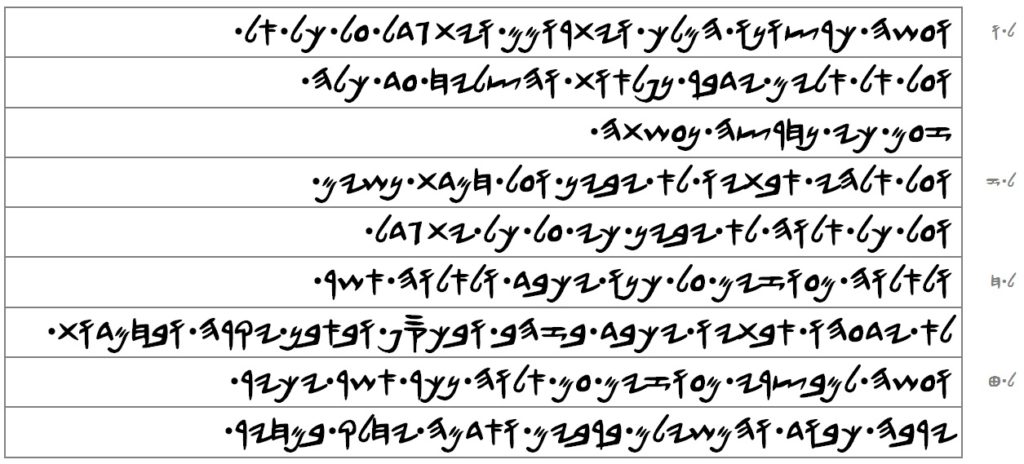
[36] And he will do according to his will, the king. And he will exalt himself, and magnify himself, upon every Higher Power, but upon the Higher Power of Higher Powers will he speak incredible things, and he will prosper until it is completed the indignation; for that which has been determined will be done.
[37] And upon the Higher Power of his fathers will he not regard, and upon the one desired of women, and upon every Higher Power will he not regard, for upon all will he magnify himself.
[38] But to the Higher Power of places of strength upon his estate will he honor, and to a Higher Power which not did his fathers know him will he honor in gold, and in silver, and in precious stones, and in desired things.
[39] And he will do to the holds of the places of strength with a strange Higher Power which he will confess, he will increase glory, and he will cause them to rule over many, and land will he divide by price.
COMMENTARY OF DANAY’AL 11:36-39
[36] This verse does not introduce a new king. This is the same man we’ve been reading about since verse 29. He is not Antiochus IV, and he is not any king the world has ever seen yet.
[37] He will not acknowledge the god of his forefathers, or any god, but he will exalt himself above all gods.
[38] Verses 36-37 give the impression that the man will be 100% narcissist, putting himself above all gods, but verse 38 tells us he will be a narcissist and a devout monotheist at the same time. He will reject all gods, exalting himself above them all, that is all except for one. He will worship the aloh mai’ozaym (‘Higher Power of places of strength’). Christians and Jews struggle with the meaning of this phrase. I do not. No man is going to come onto the world scene at any point in the future and be embraced by millions if he is openly denouncing the idol god Jesus Christ. That will never happen. Christianity is the world’s largest religion with 2.4 billion adherents. There could be back-to-back calamities all over the world, with millions of deaths and horrors unspeakable taking place, and people will still be foolishly praying to the idol Jesus Christ and begging for his help and protection. Christianity is not going anywhere. Christianity is also the “abomination, the one that desolates” mentioned in verse 31. It has been here since the 1st century CE thanks to the missionary work of Paul the Herodian.
[39] The irony is that the man speaking to Danay’al and telling him about the abomination is the man heathens have turned into the abomination. The man talking to Danay’al was prophesied to be born a human being (May’chah 5:2) and prophesied to be killed prior to the destruction of the temple and the city of Yaroshalam (Danay’al 9:26). These two events occurred in 6 BCE and 34 CE, respectively. Heathens who never knew our brother in person, never met him when he walked the earth as a human, took his story, perverted the truth into a lie, and turned him into the aloh mai’ozaym. This phrase just means the “god of churches”. The word “church” derives from the Greek kyriakon (adj.) “of the lord,” from the Proto-Indo-European root *keue, meaning “to swell” (“swollen,” hence “strong, strength”). A church is a stronghold, a place of strength where believers gather collectively and strengthen one another in their shared beliefs of their Lord. There are more than 37 million churches in the world, far more gathering places than all other faiths have on earth combined.
It does not matter that churches do not see eye to eye on everything. The sheer size and distribution of the world’s Christian population is simply mind boggling demographics, and this was foreseen by our prophets. The prophets do mention that a religion would become this popular and go forth over the face of the whole earth, but it would be a false religion based on a flying scroll that is a curse (Zachar-Ya’oh 5:1-4). This is Christianity in all of its denominations and sects, and the flying scroll is the curse of the Christian Greek New Testament which is adversarial to the holy covenant. The so-called “antichrist” is nothing other than Jesus Christ and the Greek gospel describing him. The king we are reading about will put himself above all gods except for the god who is universally called Jesus Christ, “the Higher Power of places of strength”.

[40] And at the time of the end he will thrust himself at him, the king of the south; and he will storm himself against him, the king of the north, with chariot, and with horsemen, and with many ships, and he will come into the countries and overflow, and pass on.
[41] And he will come into the land of glory, and many will be overthrown, but these will be spared from his hand: Adom, and Mo’ab, and the chief ones of the sons of Ghamon.
COMMENTARY ON DANAY’AL 11:40-41
[40] “At the time of the end” refers to a shabath year, the end of a seven-year week. The abomination will be set up at the temple in the middle of the 70th week, and our great war against Gog will conclude three and a half years later at the end of the week. A king of the south will offer Gog a challenge and Gog will respond with the ferocity of a whirlwind. It must not go unnoticed that Gog’s army consists of chariots and horsemen. The world will have been thrown back into the pre-industrial age in terms of warfare before Gog makes his entrance onto the world stage. The only thing capable of hitting the reset button on warfare in the modern age is a series of catastrophic natural disasters and cosmic disturbances over a prolonged period of time, and we have talked about when these wonders will begin to occur in several blog posts.
[41] Up to this point, Gog has not ventured into our land in person. The people who set up the abomination at the holy place which triggered the great war in our land are the apostates of Ya’oh-shar-al who joined themselves to Gog. They will betray their own people and do Gog’s dirty work. But at the time of end, Gog and his hordes will invade our land and he will spare any Adomay (Edomite), Mo’abite, and elite Ghamonay (Ammonites) who are there.
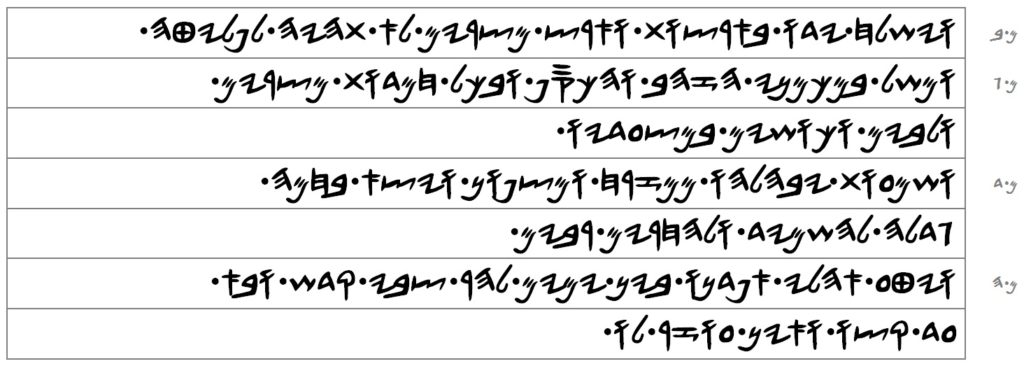
[42] And he will send forth his hand in the countries, and the land of Matsraym not will it be for escape.
[43] But he will rule over the treasures of the gold, and of the silver, and in all the pleasant things of Matsraym, and the Labaym and the Choshaym are in his steps.
[44] And reports will trouble him from the east and from the north, and he will go forth in a great rage to destroy and to exterminate many.
[45] And he will plant the tents of palace between the seas, in the mountain of glory set apart, and he will come unto his end, and there is no helper to him.
COMMENTARY ON DANAY’AL 11:42-45
[42] From our land he will send forth his armies into other countries, including Matsraym (Egypt). This means the king of the south mentioned in verse 40 is not the king of Matsraym, but of a different nation in the south.
[43] He will take possession of all the mineral wealth of Matsraym, the gold and the silver, and all of the pleasant things in that country. The Labaym (North Africa) and the Choshaym (Sub-Saharan Africa), i.e. the whole of Africa, what’s left of it, will also be targeted by his military campaign.
[44] While his forces are busy plundering African resources he will receive intel from the east and the north that will greatly trouble him, sending him into a blind rage to exterminate his opposition.
[45] But he will be driven out of our land and be forced to take up a defensive position in a barren and desolate location at the glorious set apart mountain (wrongly called ‘Ararat’ by the heathens) between the Black Sea and the Caspian Sea. Verse 45 is restating the same information recorded in Ya’oh-al (Joel) 2:20. This is the end of Gog as detailed in the writings of the prophet Ya’oh-khazak-al (Ezekiel) in chapters 38 and 39 of his book.
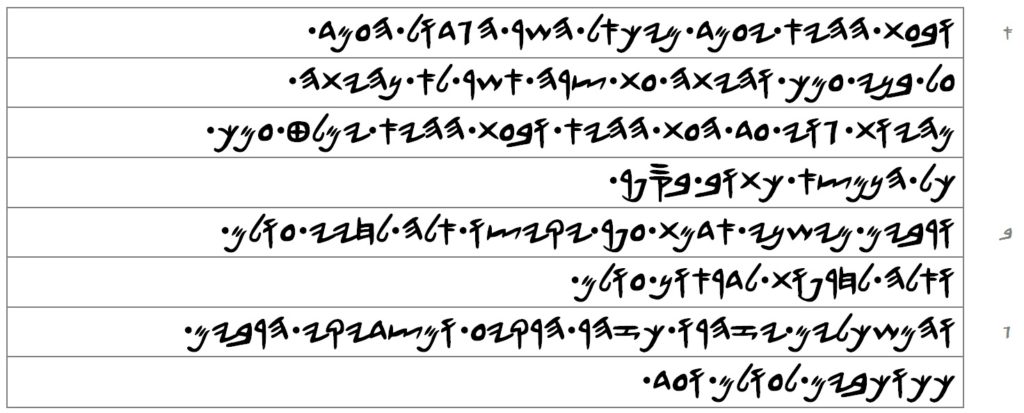
[1] And in that time May’cha’al will stand up, the great prince, the one standing for the children of your nation. And there will be a time of trouble which not has there been from since being a people unto that time, and in that time your nation will be delivered, all of the ones found written in the book.
[2] And many of the ones asleep in the land of dust will awake, these to life everlasting, and these to contempt and to shame everlasting.
[3] And the ones who are wise will shine like the brightness of the firmament, and the ones causing the many to turn to righteousness, like the stars for ever, and ever.
COMMENTARY OF DANAY’AL 12:1-3
[1] The nation of Ya’oh-shar-al has suffered horrific curses among the nations where they were scattered because their ancestors broke the covenant. The chief prince May’cha’al has been the one with the oversight to dish these curses out, following orders given to him, but he has also worked throughout the centuries to preserve the nation from being completely destroyed in the lands of their enemies. When the nation reclaims their promised land they will come under attack, as we have seen, and there will be “a time of trouble” that they have not experienced since becoming a people. This will not be a great tribulation effecting the whole world. It will only impact the people of Ya’oh-shar-al once they are back in their land. May’cha’al their prince will spring into action on their behalf from behind the scenes. Everyone of Ya’oh-shar-al whose name is found written in the book will be delivered. May’cha’al will be going over the register and making sure of it.
[2] The end of the “time of trouble” will also be the time of the resurrection of the “many” (not everyone) who are dead, the righteous for eternal reward and the unrighteous for eternal punishment. Death is not the end of anyone who is righteous in the eyes of YA’OH. They will be resurrected and be rewarded. But as for the wicked, death for some of them is like a welcomed tax refund and not a penalty. Hence, some of the wicked will be resurrected and be made to taste what real death is in order for justice to be served. The Supreme Judge will decide everyone’s fate according to their works.
[3] The wise ones and the ones causing many to return to righteousness will be physically changed and they will shine like the stars for ever. Their physical appearance will be glorious like the angels.
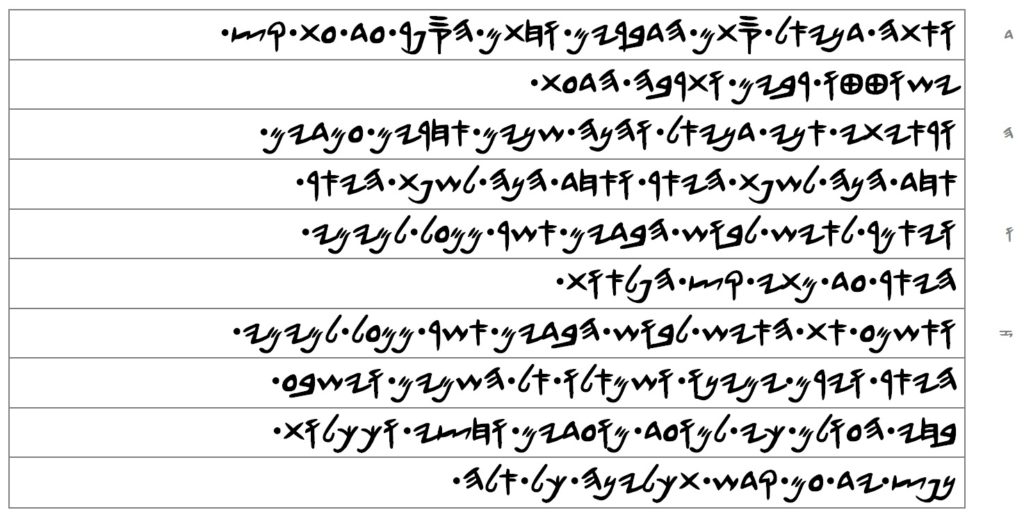
[4] And you Danay’al, shut up the words, and seal the book, until the time of the end. They will rush to and fro many, and it will be increased the knowledge.
[ 5] And I looked, I Danay’al, and behold, two others are standing. One on this side to the lip of the river, and one on that side to the lip of the river.
[6] And he said to the man dressed in the linen garment which was above to the waters of the river: ‘Until when is the end of the wonders?’
[7] And I heard the man dressed in the linen garment which is above to the waters of the river, and he raised his right hand and his left to the heaven, and he swore by the one who lives the age that it is for a time, times, and a half; and when it is completed to scatter the hand of the nation set apart they will be finished all of these.
COMMENTARY OF DANAY’AL 12:4-7
[4] Shut up the words and seal the book until “the time of the end” refers to the end of a seven-year week, a shabath year, when the book’s contents could be discerned by a prophet who is raised up in a shabath year. The meaning of the book has to first be disclosed to a prophet according to Ghamos (Amos) 3:7, and then that prophet will teach the book to others.
[5] Two additional messengers from heaven appear at this point, one on each side of the river Khadakal (Hiddekel) where the vision was taking place in 517 BCE.
[6] One of the messengers asks the man hovering above the river dressed in linen when the end of ha-pala’oth (‘the wonders’ not ‘these’ wonders) will be. A “wonder” is an extraordinary event or portent. It is a miracle of Alah’aym, but no “wonders” have been mentioned by the man in his discourse. In other words, the messenger is not asking the man to elaborate on anything he has talked about thus far. He is asking about the wonders that will take place while the remnant of Ya’oh-shar-al is in the wilderness, wonders that will destroy the whole world and all of its armies and put the world back to using horses, swords, and spears again in order to wage war. No more advanced fighter jets, no more nuclear submarines, no more tanks, no more ballistic missiles, no more machine guns or artillery. All of modern warfare technology which has advanced rapidly over the years will be rendered useless and ineffective by “the wonders” that are coming.
[7] The man dressed in linen responds. The wonders will last la-mo’aid mo’aidaym wa-khatsay (‘for a time, times, and a half). The remnant of Ya’oh-shar-al will be in the wilderness for 3.5 times, and this has been explained as a period of ninety-eight years from their Exodus: 28 years (a time) + 56 years (times) + 14 years (a half). Another way to explain this is that a mo’aid (time) is a year, and a year is 360 days minus the four intercalary days at the end of months iii, vi, ix, and xii. This gives 1,260 days (360 x 3.5 = 1,260). Yet the true length of a year according to scripture is 360 + the four intercalary days, or 364 days. This gives 1,274 days (364 x 3.5 = 1,274). There are 12 tribes of Ya’oh-shar-al plus the set apart tribe of Lo’ay, or 13 tribes total. When you divide 1,274 by the number of our tribes the result is 98 (1,274 ÷ 13 = 98). The remnant will leave the wilderness when a period of 98 years is finished and reclaim the promised land without anyone being able to oppose them. Yet they will subsequently come under attack from Gog who will “scatter the hand of the nation set apart” from the middle the of 70th week when the abomination is set up in the holy place until the end of the week.
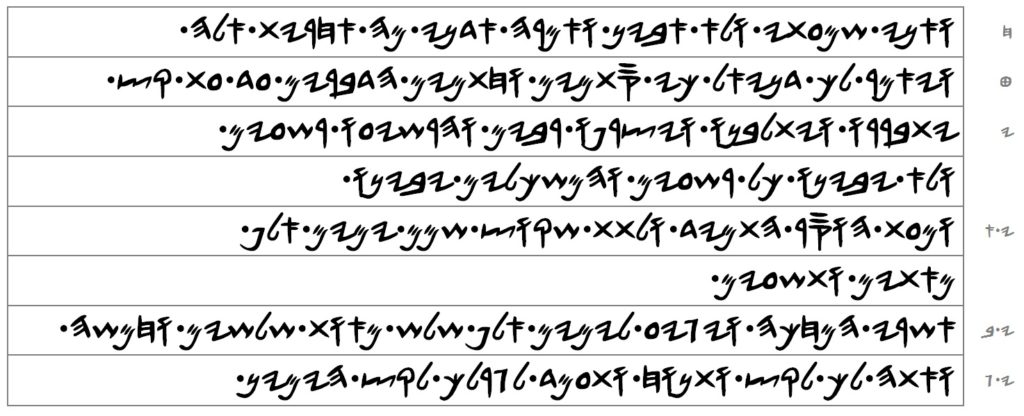
[8] And I heard, but not did I understand, and that I would say: My lord, what is the end of these?
[9] And he said: Go, Danay’al. For they are shut up and sealed up, the words, until the time of the end.
[10] They will purify themselves, and whiten themselves, and they will be tried, many. But they will do wickedness, the wicked, and not will they understand, any of the wicked. Yet the ones who are wise, they will understand.
[11] And from the time it is taken away, the continual burnt offering, and to the setting up of the abomination of desolation, 1,290 days.
[12] Blessed are the ones who wait, for they will arrive to the 1,335 days.
[13] But you, go, unto the end. And you will rest, and you will stand up to your lot at the end of the days.
COMMENTARY OF DANAY’AL 12:8-13
[8] Danay’al has understood everything that was told to him, and everything he has heard in the vision, up to the reply of the man in verse 7 because the reply came with a cryptic time measurement.
[9] Once again, Danay’al is being reminded that the time for the book’s contents to be discerned and disclosed is in a particular shabath year when a prophet is raised up and sent to the awakened of Ya’oh-shar-al.
[10] The awakened ones of Ya’oh-shar-al will purify and whiten themselves by returning wholeheartedly to keeping the covenant, but this commitment will be attended by trials. None of the wicked will understand what is happening or why, but the ones who are righteous and wise will understand and they will face the future with bold confidence because of the knowledge they will have.
[11] The man now tells Danay’al exactly how long the persecution will last once the abomination of desolation is set up in our holy place. It will last 1,290 days which is three and a half years, or half of a seven-year week.
[12] The 1,335 days is not a period of days that will follow the 1,290 days. This period includes the first half of the seven-year week. It will commence with our return to the promised land, something we have waited for and our hearts have longed to witness. The ones who will be alive when that day arrives, and will be involved in the taking of our land away from the heathens, will be blessed ones indeed. The man telling Danay’al, “Blessed are the ones who wait…” repeated these same words again after he put on human flesh: “Blessed are the ones who wait, for they will be comforted” (Mathath-Ya’oh 5:5). That our comfort and our joy for 1,335 days will be interrupted briefly by “a time of trouble” is of no consequence, for the trouble will be quickly forgotten as the people of YA’OH prevail over Gog and go on from that victory to become the rightful masters of this world, for ever.
[13] The last words to Danay’al are a promise to him that he will be resurrected from his resting place in a strange land and be brought home to the promised land where he will stand in his own lot once again. Rest easy my brother. We will see you.
Everything I have said above about the Chathab Amath (‘Writing of Truth’) is invalid unless they are being said by a genuine prophet raised up at “the time of the end”. Anyone claiming to be able to teach and to explain the Chathab Amath but who is not a prophet of YA’OH proclaiming His correct name and calling the people of Ya’oh-shar-al to return to keep the whole covenant given by the hand of Mashah, every word of it, is misleading you.
His name is YA’OH
Always has been. Always will be.
#EXODUS2023
1.15.7252 (April 5, 2023)

SHALOM AKH RAVENOUS. This! these historical evidence are mind-blowing, this this blog was a small book literally I’ve been reading this article for 2days now AKH’AY. Took a break and came back to read some more, “Noooo nooo” that only made it worse. Now I gotta read it again, I rather have a basket full of fresh fruit (Truth, Overstanding, Knowledge) Pearl, Diamond, Gold, Silver, of Phophetic Cultural Scriptural Biblical enlightenment bestowed upon us by YA’OH our ALA’AYM who has grace us with a MABAYN YA’OHDAH the RAVENOUS Bird. TOB MA’AD Lesson AKH’AY. Chal Chabod YA’OH.
YA’OH gadol!!!!
This expounded historical accounts is immensely and divinely a masterpiece of literacy at its best as it is Ya’Oh’s architectural design planned ahead of time to be now seen as writing of truth by His chosen prophet! Ya’Oh’s words are truth that burns! Halalo Ath Ya’Oh!